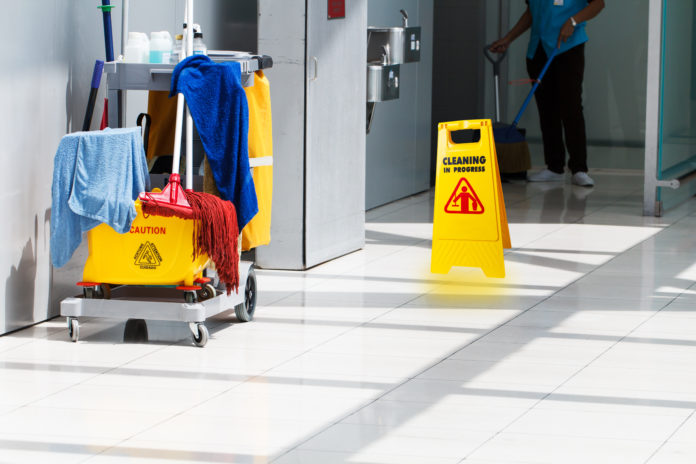Claims for costs arising out a custodial contract is granted in part and denied in part. The contractor had a contract to clean a VA medical facility. The contractor filed claims for (1) costs incurred as the result of an infectious outbreak at the facility, and (2) costs incurred for cleaning buildings more frequently than the contract required. The board found that the infection was a constructive change to the contract, and the contractor was entitled to be reimbursed for that change. The board, however, found that the second claim for the frequency of cleaning was not a constructive change. This change had been added to the contract as part of the solicitation amendment. While, the contractor had not received all the pages of the amendment, it had not inquired about the extra pages and thus those pages, which changed the scope of the PWS, became part of the contract.
Valerie Lewis Janitorial (VLJ) had a contract with the Department of Veterans Affairs to provide custodial services at a medical center in Northern California. For three years of contract performance, the parties disputed which buildings at the facility VLJ was obligated to clean and how many times a week the company was obligated to clean them. VLJ cleaned some of the disputed buildings for a part of the performance period and then stopped.
Shortly after VLJ began performance, the facility had an outbreak clostridium difficile (C. diff), an infection transmitted through spores that results in severe diarrhea and poses significant risk to elderly patients. As a result of this infection, VLJ had to institute a new, two-step cleaning process at the VA facility. The VA recommended contract modification for the cost of the additional cleaning steps. But the parties never amended the contract to account for the extra work.
After three years of performance, VLJ filed two claims. The first claim sought $272,751 in reimbursement for costs incurred from implementing the two-step cleaning process due to the C. diff, outbreak. The second claim sought $441,000 in extra janitorial services VLJ performed that exceeded the scope of the contract. In particular, VLS contended it had been forced to clean some buildings more times per week than the terms of the contact required.
The VA denied VLJ’s claims and then asserted two counterclaims against the company for (1) $112,682 for VLJ’s use of the VA’s mops and laundry services, and (2) $56,9924 for janitorial services that for two building that VLJ had stopped cleaning during performance. VLJ appealed its claims and the counterclaims to the CBCA.
The board granted the VLJ’s appeal on the added two-step cleaning process. The board reasoned that when the government orders performance more stringent than that required by the contract, a constructive change occurs. The board found that the VA’s instruction to use a two-step cleaning process for the C. diff. outbreak resulted in a constructive change. The VA’s infection control personnel had determined that a second cleaning with diluted bleach was the only effective way of destroying the C. diff. spores. This was work beyond the scope of the contract.
The VA attempted to argue that the VLJ was not entitled to any compensation for the extra work. This argument was based on of statements that the VA had obtained from unidentified VLJ employees about how long it took them to the clean the rooms. The board, however, found these statements were unsupported. The factual bases for the employee comments were unknown and they were not made in affidavits or testimony.
The VA had prepared a draft contract modification, which determined that VLJ was entitled to an additional $173,000 for the extra two-step cleaning. This modification had never been added to the contract. Still, the board found that the VA had offered no evidence to disprove its own time study for the modification. The board adopted that draft modification as the proper measure for the cost of VLJ’s extra work resulting from the C. diff. outbreak.
The board was less enamored or VLJ’s second claim for cleaning some buildings more frequently than the contract required. The VA argued that the extra cleaning had been added to a contract through a solicitation amendment that had significantly altered the PWS. VLJ disputed whether that amendment had actually become part of the contract. VLJ argued that it had only received the first page of the 72 page amendment and thus was not aware that this amendment had changed the original PWS.
The board, however, noted that VLJ had acknowledged receipt of the amendment. When a contractor acknowledges an amendment that does not have all the indicated pages, the contractor is responsible for inquiring about the additional pages. Even though VLJ had received one page, it should have inquired about the missing 71 pages that significantly changed the PWS. That amendment had changed the scope or work concerning the frequency of cleaning. VLJ, having received notice of the amendment and having not asked about the additional pages, could not claim the work exceeded the scope of the contract.
Finally, the board found that the VA’s counterclaims lacked merit. As to the claim for use of the VA’s mops and laundry, the board found that the VA had directed VLJ to commence work the VA’s mops and laundry service. The record did not explain why VLJ had used VA mops and laundry for almost a year-and-a-half, but there was no evidence of impropriety. Also, with regard to the claim for the costs the VA incurred in cleaning buildings that VLJ stopped cleaning, the board found that the contracting officer’s representative had allowed VLJ to stop cleaning those buildings. While the VA may have now disagreed with that agreement, the board was unwilling to undermine it.
VLJ is represented by Theodore P. Watson of Watson & Associates, LLC. The government is represented by David G. Fagan of the Department of Veterans Affairs.





